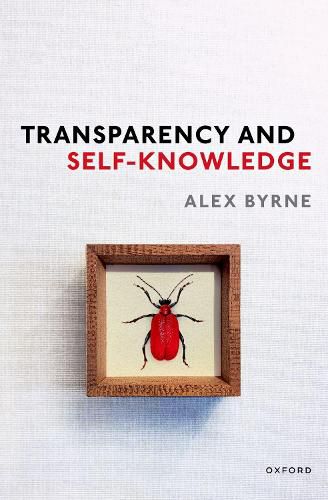Readings Newsletter
Become a Readings Member to make your shopping experience even easier.
Sign in or sign up for free!
You’re not far away from qualifying for FREE standard shipping within Australia
You’ve qualified for FREE standard shipping within Australia
The cart is loading…






Alex Byrne sets out and defends a theory of self-knowledge-knowledge of one’s mental states. Inspired by Gareth Evans’ discussion of self-knowledge in his The Varieties of Reference, the basic idea is that one comes to know that one is in a mental state M by an inference from a worldly or environmental premise to the conclusion that one is in M. (Typically the worldly premise will not be about anything mental.) The mind, on this account, is ‘transparent’: self-knowledge is achieved by an ‘outward glance’ at the corresponding tract of the world, not by an ‘inward glance’ at one’s own mind. Belief is the clearest case, with the inference being from ‘p’ to ‘I believe that p’. One serious problem with this idea is that the inference seems terrible, because ‘p’ is at best very weak evidence that one believes that p. Another is that the idea seems not to generalize. For example, what is the worldly premise corresponding to ‘I intend to do this’, or ‘I feel a pain’? Byrne argues that both problems can be solved, and explains how the account covers perception, sensation, desire, intention, emotion, memory, imagination, and thought. The result is a unified theory of self-knowledge that explains the epistemic security of beliefs about one’s mental states (privileged access), as well as the fact that one has a special first-person way of knowing about one’s mental states (peculiar access).
$9.00 standard shipping within Australia
FREE standard shipping within Australia for orders over $100.00
Express & International shipping calculated at checkout
Alex Byrne sets out and defends a theory of self-knowledge-knowledge of one’s mental states. Inspired by Gareth Evans’ discussion of self-knowledge in his The Varieties of Reference, the basic idea is that one comes to know that one is in a mental state M by an inference from a worldly or environmental premise to the conclusion that one is in M. (Typically the worldly premise will not be about anything mental.) The mind, on this account, is ‘transparent’: self-knowledge is achieved by an ‘outward glance’ at the corresponding tract of the world, not by an ‘inward glance’ at one’s own mind. Belief is the clearest case, with the inference being from ‘p’ to ‘I believe that p’. One serious problem with this idea is that the inference seems terrible, because ‘p’ is at best very weak evidence that one believes that p. Another is that the idea seems not to generalize. For example, what is the worldly premise corresponding to ‘I intend to do this’, or ‘I feel a pain’? Byrne argues that both problems can be solved, and explains how the account covers perception, sensation, desire, intention, emotion, memory, imagination, and thought. The result is a unified theory of self-knowledge that explains the epistemic security of beliefs about one’s mental states (privileged access), as well as the fact that one has a special first-person way of knowing about one’s mental states (peculiar access).